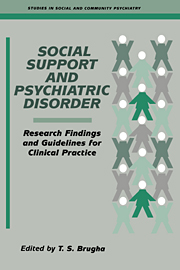Book contents
- Frontmatter
- Contents
- Preface
- List of contributors
- 1 Social support and psychiatric disorder: overview of evidence
- PART I CONCEPTS AND ORIGINS OF SOCIAL SUPPORT
- 2 Understanding social support within the context of theory and research on the relationship of life stress and mental health
- 3 A developmental perspective on social support networks
- 4 Cognitive aspects of social support processes
- 5 Attachment, cooperation and rank: the evolution of the need for status and social support
- PART II LESSONS FROM SELECTED OBSERVATIONAL STUDIES
- PART III LESSONS FROM INTERVENTION STUDIES
- PART IV INTERVENTION PRINCIPLES AND RECOMMENDATIONS
- Index
5 - Attachment, cooperation and rank: the evolution of the need for status and social support
from PART I - CONCEPTS AND ORIGINS OF SOCIAL SUPPORT
Published online by Cambridge University Press: 31 October 2009
- Frontmatter
- Contents
- Preface
- List of contributors
- 1 Social support and psychiatric disorder: overview of evidence
- PART I CONCEPTS AND ORIGINS OF SOCIAL SUPPORT
- 2 Understanding social support within the context of theory and research on the relationship of life stress and mental health
- 3 A developmental perspective on social support networks
- 4 Cognitive aspects of social support processes
- 5 Attachment, cooperation and rank: the evolution of the need for status and social support
- PART II LESSONS FROM SELECTED OBSERVATIONAL STUDIES
- PART III LESSONS FROM INTERVENTION STUDIES
- PART IV INTERVENTION PRINCIPLES AND RECOMMENDATIONS
- Index
Summary
This chapter will explore the role and function of social support from an evolutionary perspective. It is suggested that social behaviour has evolved over many millions of years and has given rise to a range of possibilities for social relating. Although in any particular interpersonal encounter many factors come into play (such as personal history, goals, emotional state (as discussed by Champion and by Brewin in this volume) and cultural values; see Hinde, 1987, 1992), it is still possible to recognise archetypal patterns of social relating. Examples are those based on attachment, cooperation and rank (e.g. dominant–subordinate). An evolutionary perspective clarifies our need for supportive relationships and offers a bridge to understanding the biological consequences of gaining and losing supportive relationships. In other words the importance of social support is very much related to the fact that we have evolved into highly social animals. A central facet of the argument developed here is that supportive relationships are reliable, should support status (the recipient feels valued) and are experienced as status-enhancing rather than opening a possibility for shaming and loss of status (Parry, 1988). This perspective also broadens the emphasis from individualistic theories of the causes and cures of psychopathology to understanding individuals in communities and their patterns of interaction.
Development
Infants are born ready to respond to other social beings. They are innately prepared to learn and take interest in the social environment (interest in faces, smiling, seeking and being reassured by physical contact, suckling, and so on).
Keywords
- Type
- Chapter
- Information
- Social Support and Psychiatric DisorderResearch Findings and Guidelines for Clinical Practice, pp. 117 - 142Publisher: Cambridge University PressPrint publication year: 1995

